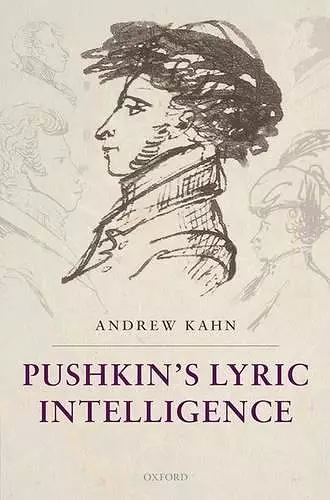Pushkin's Lyric Intelligence
Format:Paperback
Publisher:Oxford University Press
Published:31st May '12
Currently unavailable, and unfortunately no date known when it will be back

Alexander Pushkin (1799-1837) is Russia's greatest poet, a 'founding father' of modern Russian literature, and a major figure in world literature. His poetry and prose changed the course of Russian culture, and his works inspired operas by Musorgsky and Tchaikovsky (as well as Peter Shaffer's Amadeus). Ceaselessly experimental, he is the author of the greatest body of lyric poetry in the language; a remarkable novelist in verse, and a pioneer of Russian prose fiction; an innovator in psychological and historical drama; and an amateur historian of serious purpose. Like Byron, whose writing and personality were an inspiration to him, Pushkin had a sensational life, the stuff of Romantic legend. His writing treats all the most important themes that great literature can addresss-the nature of identity, love and betrayal, independence and creativity, nature, the meaning of life, death and the afterlife-in an elegant style and highly personal voice. Lyric intelligence refers to Pushkin's capacity to transform philosophical and aesthetic ideas into poetry. Arguing that Pushkin's poetry has often been misunderstood as transparently simple, this first major study of this substantial body of work traces the interrelation between his writing and the influences of English and European literature and cultural movements on his understanding of the creative process and the aims of art. Andrew Kahn approaches Pushkin's poetic texts through the history of ideas, and argues that in his poetry the clashes that matter are not about stylistic innovation and genre, as has often been suggested. Instead the poems are shown to articulate a range of positions on key topics of the period, including the meaning of originality, the imagination, the status of the poet, the role of commercial success, the definition of genius, represenation of nature, the definition of the hero, and the immortality of the soul. Drawing on an extensive knowledge of Pushkin's library and his intellectual context, Pushkin's Lyric Intelligence addresses how theories of inspiration informed Pushkin's thinking about classicism and Romanticism in the 1820s and 1830s. The story of the unfolding of the imagination as a vital poetic power and concept for Pushkin is a consistent theme of the entire book. It is this movement towards a fuller apprehension and application of the imagination as the key poetic power that guided Pushkin's transitions...
Review from previous edition Kahn has taken an exhilarating new direction in Pushkin studies... Kahn's close readings remind us just how much lingering in the study lay behind the creation of Pushkin's fleet-footed lines. * Rachel Polonsky, Times Literary Supplement *
Andrew Kahn has produced an extremely erudite study of Pushkin's lyrics...The volume is imaginatively organized around a set of themes that shed light on how Russia's greatest poet formed and developed his ideas. * MLA Prize committee *
Kahn has reset one horizon for twenty-first-century Pushkin studies. It is a rare book that makes us reconsider what we thought we knew so fundamentally * Monika Greenleaf, Slavic Review *
Pushkin's Lyric Intelligence is handsomely produced by Oxford University Press... with splendid illustrations for the chapter on heroism. Kahn writes elegantly and incisively * Stephanie Sandler, East European Journal *
- Winner of Honourable Mention, MLA's Aldo and Jeanne Scaglione Prize for Studies in Slavic Languages and Literatures 2009.
ISBN: 9780199654338
Dimensions: 234mm x 153mm x 23mm
Weight: 638g
412 pages